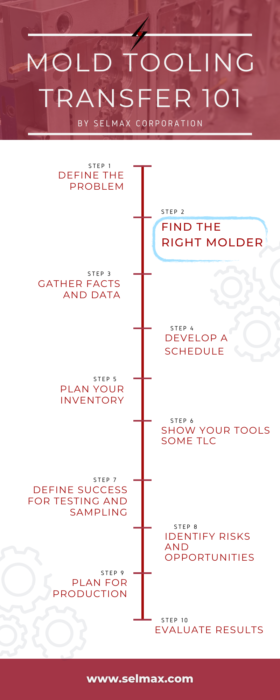
After you’ve identified the problems and risks with your current supplier and decided you want to initiate a mold tooling transfer, it’s time to begin the search for a plastic injection molder that better aligns with your needs. Depending on your goals, some things may hold higher priority for you than others.
Here are some criteria to use that can help you quickly narrow down your search to find the right molder for your mold tooling transfer:
Machine Capabilities & Capacity
You’ll need to be sure that your new molder has the machine size and capacity available to handle your molds and the production volumes you’ll need to make each year. Be sure to provide prospective molders with your mold size, part size, and annual production numbers to set clear expectations from the start.
Industry Expertise
Another consideration for potential molders is their previous experience in your industry. This is especially important for industries, such as food/beverage, that require certain food-safe materials, or medical, that require special manufacturing considerations and certifications.
If the molder has not worked with your industry in the past, are they knowledgeable and capable of producing your parts to the standards you require?
In-House Tool Maintenance
Your new molder should have an in-house machine shop to properly care for and maintain your molds for the life of your project. If you’re transferring in molds with a lot of cycles on them, this will be especially important as they may need some TLC before they’re ready to run smoothly.
Material Sourcing and Handling
Does your prospective molder have a good relationship with high-quality raw materials suppliers? Are they able to get the exact materials you need in the quantities you need for your project? This is especially important in volatile times when the forces of supply and demand impact material availably and pricing. A good molder has built relationships with these suppliers over many years and may have an advantage in the marketplace.
Reputation and Experience
Be sure to check out your prospective molder’s reputation before committing to a tooling transfer. Ask them about their experience with mold tooling transfers in the past. Ask them to outline their process for transfers and what they do to mitigate risk and downtime.
Look for reviews on Google, check out their website, and find out how many years they’ve been in business.
Certifications
What certifications does the plastic injection molder have? Are they ISO 9001:2015 certified? You should also check to see if they’re members of industry associations, such as MAPP (Manufacturers Association for Plastic Processors).
Level of Support
Many molders may meet all your criteria for capacity, size, and manufacturing capabilities. However, it is also important to set an expectation for the level of support that will be provided throughout the life of your project.
Finding an injection molder that can work closely with you through each stage of the transfer process could be invaluable to your project. Having a seasoned consultant to help guide you through the process can save time and money and ensure that your mold transfer process is seamless.
Competitive Pricing
It’s important to ensure that your new molder has competitive pricing over the long run. However, the obvious prices, such as mold setup fees or part price are not the only way to determine the pricing structure. You should also look for hidden costs and risks that could end up amounting to more money over time.
For example, materials could be wasted producing low-quality parts, long lead times could interrupt your supply chain, or communication issues could result in parts that aren’t up to your standards.
Other Considerations
There are other things to take into consideration when choosing a new plastic injection molder for your project. Depending on the level of support you require, someone that is local or easily accessible may be important so you can meet in-person without too much hassle.
If your project requires after-ops processes such as assembly, sonic welding, or special packaging, these would all be important to discuss with your potential molder to be sure that they offer those services.
Another consideration is delivery requirements. If you have stringent delivery demands, it will be important to ensure that your chosen molder can meet or exceed your expectations. Make sure they’re well-established with trusted carriers and have the ability and experience to ship internationally, if needed.
Selmax Capabilities
With over 50 years of experience, Selmax Corporation takes great pride in meeting the most stringent material, color, and delivery requirements. Located in Selinsgrove, Pennsylvania, Selmax is within 4 hours of NYC, Philadelphia, Pittsburgh, Baltimore, and Washington D.C. and serves customers worldwide.
We offer services from concept to delivery, including design, 3D printing, mold making, production, assembly, packaging, and even short-term warehousing.
We also offer a high level of support throughout the process to make your mold transfer as seamless as possible.
Request a Quote to start the process today.
More in this series:
Step 3: Gathering Facts and Data
Step 5: Planning Your Inventory
Step 6: Showing Your Tools Some TLC
Step 7: Defining Success for Testing and Sampling
Step 8: Identifying Risks and Opportunities
Step 9: Planning for Production
Step 10: Evaluating Results









4 Comments
Mold Tooling Transfer 101: Planning Your Inventory - Selmax Corporation
[…] Step 2: Finding the Right Molder […]
Mold Tooling Transfer 101: Developing a Schedule - Selmax Corporation
[…] Step 2: Finding the Right Molder […]
Mold Tooling Transfer 101: Defining Mold Testing Success - Selmax Corporation
[…] Step 2: Finding the Right Molder […]
Mold Tooling Transfer 101: Showing Your Tools Some TLC - Selmax Corporation
[…] Step 2: Finding the Right Molder […]